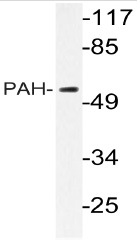PAH Rabbit Polyclonal Antibody
Other products for "PAH"
Specifications
| Product Data | |
| Applications | IHC, WB |
| Recommended Dilution | Western blot: 1/500 - 1/1000. Immunohistochemistry on paraffin sections: 1/50 - 1/200. |
| Reactivities | Human, Mouse, Rat |
| Host | Rabbit |
| Clonality | Polyclonal |
| Specificity | This antibody detects endogenous levels of PAH protein. (region surrounding Arg400) |
| Formulation | Phosphate buffered saline (PBS), pH 7.2. State: Aff - Purified State: Liquid purified Ig fraction Preservative: 0.05% sodium azide |
| Concentration | 1.0 mg/ml |
| Purification | Affinity chromatography (> 95% (by SDS-PAGE) |
| Storage | Store undiluted at 2-8°C for one month or (in aliquots) at -20°C for longer. Avoid repeated freezing and thawing. |
| Stability | Shelf life: one year from despatch. |
| Predicted Protein Size | ~ 55 kDa |
| Gene Name | Homo sapiens phenylalanine hydroxylase (PAH) |
| Database Link | |
| Background | The PAH gene encodes the enzyme phenylalanine hydroxylase (PAH), which converts phenylalanine to tyrosine and is the rate-limiting enzyme in phenylalanine catabolism. Mammalian PAH is a soluble, homotetrameric protein which is abundantly expressed in human liver. Deficiency of PAH activity results in the autosomal recessive disorder phenylketonuria (PKU), which is characterized by mental retardation unless a low phenylalanine diet is introduced early in life. The PAH gene, which maps to human chromosome 12q23.2, contains all the genetic information necessary to code for functional PAH, demonstrating that a single gene is involved in the classic disease phenotype. Numerous mutations can impair the PAH gene, which result in decreased enzyme activity and give rise to varying degrees of PKU. Multiple isozymes of PAH have been reported to exist, but these are most likely allelic variants of PAH that produce protein subunits with slightly different charge and electrophoretic migration. |
| Synonyms | Phenylalanine Hydroxylase, PH, PKU1, PKU |
| Reference Data | |
| Protein Families | Druggable Genome |
| Protein Pathways | Metabolic pathways, Phenylalanine, tyrosine and tryptophan biosynthesis, Phenylalanine metabolism |
Documents
| Product Manuals |
| FAQs |
{0} Product Review(s)
0 Product Review(s)
Submit review
Be the first one to submit a review
Product Citations
*Delivery time may vary from web posted schedule. Occasional delays may occur due to unforeseen
complexities in the preparation of your product. International customers may expect an additional 1-2 weeks
in shipping.






























































































































































































































































 Germany
Germany
 Japan
Japan
 United Kingdom
United Kingdom
 China
China




